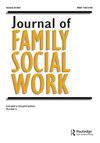自闭症成人的老年家庭照顾者的生活质量预测因素
IF 0.7
Q3 SOCIAL WORK
引用次数: 0
摘要
在美国,家庭照顾者为需要照顾支持的亲人提供了主要的照顾。随着照顾者年龄的增长和健康状况的下降,生活质量和照顾者负担受到影响。本研究的目的是确定照顾者负担领域(时间依赖、发育、情感和经济对照顾的影响)和非正式社会支持是否是自闭症谱系障碍(ASD)成年儿童的年迈父母照顾者的生活质量的预测因素。参与者(N = 320)包括至少50岁且有一个成年子女(18岁以上)被诊断为ASD的照顾者。研究结果表明,在控制照顾者年龄和自我报告健康后,三个变量(发育负担、情绪负担和非正式社会支持)进入多元线性回归分析,作为生活质量的显著预测因子。社会工作者和其他卫生专业人员应认识到照顾者的健康状况下降,这可能影响他们提供护理的能力。他们还应该鼓励家人和朋友通过提供情感支持和帮助完成日常任务来帮助照顾者。当访问老年护理人员时,专业人员应寻找健康状况下降的迹象,并建议护理人员访问他或她的初级保健提供者。本文章由计算机程序翻译,如有差异,请以英文原文为准。
Predictors of quality of life for aging family caregivers of adults with autism
ABSTRACT Family caregivers provide the predominance of care for loved ones requiring caregiving support in the United States. Quality of life and caregiver burden are impacted as caregivers age and their health declines. The purpose of this study was to determine if the domains of caregiver burden (time dependence, developmental, emotional, and impact of finances on caregiving) and informal social support were predictors of quality of life for aging parental caregivers of adult children with autism spectrum disorder (ASD). Participants (N = 320) included caregivers who were at least 50 years of age and had an adult child (18+) diagnosed with ASD. The findings indicated that three variables (developmental burden, emotional burden, and informal social support) entered the multiple linear regression analysis as significant predictors of quality of life after controlling for caregiver age and self-reported health. Social workers and other health professionals should be cognizant of health declines in caregivers that could impact their ability to provide care. They also should encourage family and friends to assist caregivers by providing emotional support and helping with everyday tasks. When visiting aging caregivers, professionals should look for signs of declining health and suggest the caregiver visit his or her primary care provider.
求助全文
通过发布文献求助,成功后即可免费获取论文全文。
去求助
来源期刊

Journal of Family Social Work
SOCIAL WORK-
CiteScore
2.10
自引率
0.00%
发文量
4
期刊介绍:
Each issue of the Journal of Family Social Work contains peer reviewed research articles, conceptual and practice articles, creative works, letters to the editor, and book reviews devoted to innovative family theory and practice subjects. In celebrating social workers" tradition of working with couples and families in their life context, the Journal of Family Social Work features articles which advance the capacity of practitioners to integrate research, theory building, and practice wisdom into their services to families. It is a journal of policy, clinical practice, and research directed to the needs of social workers working with couples and families.
 求助内容:
求助内容: 应助结果提醒方式:
应助结果提醒方式:


